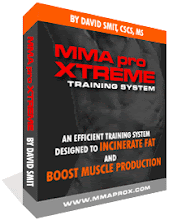I just got a copy of Jim Wendler's Max Effort Book. So I guess this will be literature review.
This book, much like his III book, is pretty simple and to the point. It has a lot of the stuff that you think you know inside and out, until you read it again. If you are a fan of Wendler humour, you will enjoy this book as it is full of it. It reads as if he was sitting in the room and telling you how it is.

It covers all the basics in regards to a "Westside" template. (and he even explains why not everyone should be running around claiming to train "westside" or just throwing the name out there for improved street cred.
One of the things that I like most about the way he explains the exercises is that he straight up tells you the ones he likes and why he likes them (or why most people like them), but doesn't take a shit on the ones he doesn't like. It's biased, but somewhat not biased. (if that makes any sense at all)
Bottom line is, it's a good read, loaded with good info, and simple enough for the rest of us. I'll be honest, Super Training is WAY over my head. I've got a copy, and it's really good for a one board press. (although I've recently put it in the bathroom at home to try and read a few more sections)
I'm gonna get off topic now and touch on a subject that needs mention. If you come up to me and start blabbering on about neuromuscular this and rigormortis fasciata that, I tune you the fuck out. I'm not University educated. Is it important to know all the fancy words and flow charts and graphs and skeleton diagrams? Not so far. Everything I've learned has been from books (that I could understand), seminars, and trying shit out in the gym myself over the last 15 years. Knowing all the big, book learnin' words may impress some people, but it just confuses the hell out of 99% of the people you will ever work with in the training business. Lucky for me, I have a good buddy who knows all the book learnin' words and flow charts and diagrams, but he also knows how to lift a barbell and work hard in the gym. So when I get stuck, guess who I call on?
Anyways, if you want a good book to help pass the time you spend in the crapper, as well as further your skills and knowledge in the game of getting stronger, buy the book.
This book, much like his III book, is pretty simple and to the point. It has a lot of the stuff that you think you know inside and out, until you read it again. If you are a fan of Wendler humour, you will enjoy this book as it is full of it. It reads as if he was sitting in the room and telling you how it is.

It covers all the basics in regards to a "Westside" template. (and he even explains why not everyone should be running around claiming to train "westside" or just throwing the name out there for improved street cred.
One of the things that I like most about the way he explains the exercises is that he straight up tells you the ones he likes and why he likes them (or why most people like them), but doesn't take a shit on the ones he doesn't like. It's biased, but somewhat not biased. (if that makes any sense at all)
Bottom line is, it's a good read, loaded with good info, and simple enough for the rest of us. I'll be honest, Super Training is WAY over my head. I've got a copy, and it's really good for a one board press. (although I've recently put it in the bathroom at home to try and read a few more sections)
I'm gonna get off topic now and touch on a subject that needs mention. If you come up to me and start blabbering on about neuromuscular this and rigormortis fasciata that, I tune you the fuck out. I'm not University educated. Is it important to know all the fancy words and flow charts and graphs and skeleton diagrams? Not so far. Everything I've learned has been from books (that I could understand), seminars, and trying shit out in the gym myself over the last 15 years. Knowing all the big, book learnin' words may impress some people, but it just confuses the hell out of 99% of the people you will ever work with in the training business. Lucky for me, I have a good buddy who knows all the book learnin' words and flow charts and diagrams, but he also knows how to lift a barbell and work hard in the gym. So when I get stuck, guess who I call on?
Anyways, if you want a good book to help pass the time you spend in the crapper, as well as further your skills and knowledge in the game of getting stronger, buy the book.



1 comment:
And what do we talk about most of the time....the 'simple' stuff, right. Paralysis by analysis, getting people day by day.
The science is important but I think it's more of a recognition. You don't need to know it all but you need to recognize when something important comes up that dictates whether or not you change what you are doing.
JF
Post a Comment